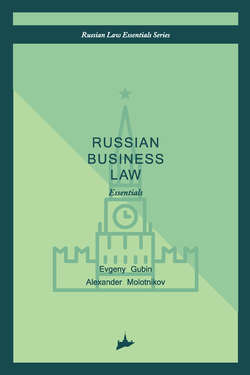Читать книгу Russian business law: the essentials - - Страница 45
Svetlana Popova[42]
Chapter 3 – Core Business Contracts
1. The Contract As a Basis for Creating Obligations
1.2. General Provisions on Contracts
1.2.2. The Rules on the Amendment and Termination of a Contract
Оглавление1.2.2.1. The grounds for the amendment or termination of a contract
The amendment and termination of a contract are possible by an agreement of the parties, or by a court decision.
An agreement to amend or terminate a contract shall be made in the same form as the contract that has been concluded, unless otherwise implied by the laws, regulations, customs of trade, or by the contract.
Upon one of the parties’ request, a contract may be amended or terminated by a decision of a court in case of:
– a substantial breach of the contract by the counterparty (Article 450 of the CC of the RF). A breach of a contract by one party shall be recognized as substantial, if it entails damages for the counterparty that significantly deprive the party from what they had the right to expect upon conclusion of the contract;
– a substantial change of circumstances (Article 451 of CC of the RF). A change of circumstances shall be recognized as substantial when they have changed the contract to the extent that the contract would not have been concluded, or it would have been concluded on significantly different terms, if the parties could have reasonably foreseen these changes;
– or in other cases provided by law or contract.
Before applying to the court, the party intending to amend or terminate the contract shall comply with the rules of pre-trial procedures, which includes the submission of a proposal to the counterparty to amend or terminate the contract. The court shall consider the request to amend or terminate the contract, if the counterparty rejected such a proposal, or the response has not been received in due course. Non-compliance with the rules of pre-trial procedures shall result in leaving the claim without consideration (Article 148 of the Arbitration Procedural Code of the RF). This, however, does not deprive the claimant from the right to apply again after complying with those rules.
1.2.2.2. Unilateral refusal to perform the contract
The law or the contract may allow the parties to unilaterally refuse to perform the contract (or to exercise relevant rights). In this case, the party may inform the counterparty of its refusal to perform the contract (Article 450.1 of the CC of the RF). The contract is terminated from the moment such notice has been received, unless otherwise provided by law or stipulated in the contract. From that moment forward, the contract shall be deemed to be terminated or amended.
1.2.2.3. The consequences of contract termination
Upon termination of a contract, the obligations of the parties shall be terminated unless otherwise provided by law, or implied from the nature of the obligations (Article 453 of the CC of the RF). The parties do not have the right to demand the return of what was performed by them under an obligation, before the time of amendment or termination of a contract, unless otherwise provided by law, or agreed by the parties. In a situation where before the termination of the contract, one of the parties has performed its obligations but the counterparty has not, the rules of unjust enrichment apply to the relationship.
The Opinion of the Plenum of the Supreme Court of Arbitration of the RF, ruled on the following stipulations, in clause 5 of Resolution No. 35, dated June 6, 2014.[52] According to this ruling, upon the termination of a contract, a party has the right to demand the return of property in the following circumstances:
– the party has transferred some property to the counterparty’s property as a performance of the contract;
– the counterparty has not performed its obligations properly or at all;
– in this respect, the court has found the parties to be in violation of the equality of their performance.
Moreover, all of the encumbrances (e.g. mortgage) of the returned property shall persist, which were existing at the time of being in the possession of the counterparty.
52
Resolution No. 35 of the Plenum of the Supreme Court of Arbitration of the RF, dated June 6, 2014, "On Consequences of the Termination of a Contract," // “ConsultantPlus” Legal Directory System
